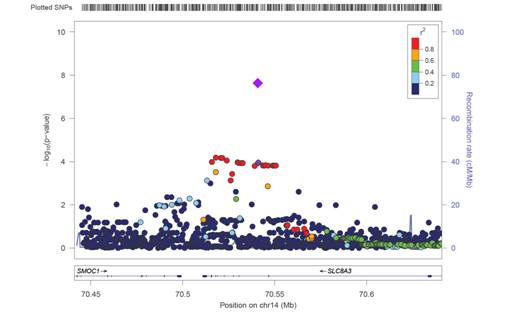Session Information
Session Type: ACR Poster Session A
Session Time: 9:00AM-11:00AM
Background/Purpose: Rheumatoid Arthritis (RA) patients with serum anti-citrullinated
peptide antibodies (ACPA) have a strong and specific genetic background. We
performed a genome-wide association study (GWAS) of ACPA-positive RA with
erosive disease to identify additional disease susceptibility genes.
Methods: A total of 924 ACPA-positive RA patients with joint damage in
hands and/or feet, and 1,524 healthy controls were genotyped in 582,591
single-nucleotide polymorphisms (SNPs) in the discovery phase. In the
validation phase, the most significant SNPs in the GWAS representing new candidate
loci for RA were tested in an independent cohort of 863 ACPA-positive patients
with joint damage and 1,152 healthy controls. All individuals from the
discovery and validation cohorts were Caucasian and from Southern European
ancestry.
Results: In the discovery phase, 60 loci not previously associated with
RA risk showed evidence for association at P <
5e-4 and were tested for replication in the validation cohort. A total of 12
loci were replicated at the nominal level (P < 0.05, same direction of effect as in the discovery phase).
When combining the discovery and validation cohorts, an intronic SNP in Solute
Carrier family 8 gene (SLC8A3) was found to be associated with
ACPA-positive RA at a genome-wide level of significance RA (OR(95%CI):
1.42(1.25-1.6), Pcombined = 3.19e-8, Figure 1).
Figure 1. Association results for SLC8A3 locus with
ACPA-positive RA. Significance
-log10(P-value) of association of SNPs at SLC8A3 locus with ACPA-positive RA.
The genome-wide significant marker is plotted as a purple diamond, and all the
remaining markers as color-coded according to their LD with this SNP.
Conclusion: SLC8A3 was identified as new risk locus for ACPA-positive RA. This
study demonstrates the advantage of analyzing relevant subsets of RA patients
to identify new genetic risk variants.
To cite this abstract in AMA style:
Julià A, González-Alvaro I, Fernandez-Nebro A, Blanco F, Fernandez Gutierrez B, Gonzalez A, Cañete JD, Maymo J, Alperi-López M, Olivé A, Corominas H, Martínez Taboada V, Erra A, Sanchez Fernandez S, Alonso A, López-Lasanta M, Tortosa R, Bridges SL Jr., Tornero J, Marsal S. A Genome-Wide Association Study Identifies SLC8A3 As a Susceptibility Locus for ACPA-Positive Rheumatoid Arthritis [abstract]. Arthritis Rheumatol. 2015; 67 (suppl 10). https://acrabstracts.org/abstract/a-genome-wide-association-study-identifies-slc8a3-as-a-susceptibility-locus-for-acpa-positive-rheumatoid-arthritis/. Accessed .« Back to 2015 ACR/ARHP Annual Meeting
ACR Meeting Abstracts - https://acrabstracts.org/abstract/a-genome-wide-association-study-identifies-slc8a3-as-a-susceptibility-locus-for-acpa-positive-rheumatoid-arthritis/

